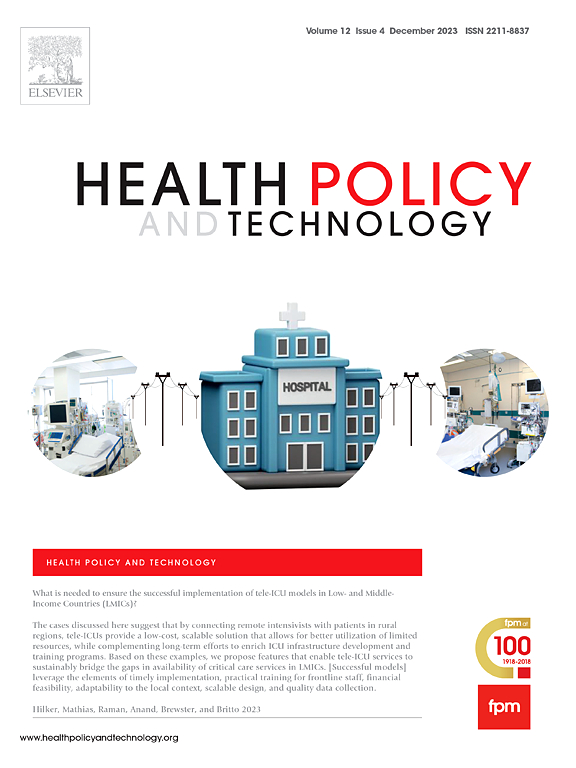引领东盟地区医疗保健领域的人工智能(AI)治理准备
IF 3.7
3区 医学
Q1 HEALTH POLICY & SERVICES
引用次数: 0
摘要
国际货币基金组织(IMF)报告称,全球40%的工作将受到人工智能(AI)的影响。将人工智能集成到医疗保健中,有望彻底改变患者护理、诊断和治疗策略,但也存在关于人工智能算法中数据隐私、安全性和偏见等伦理问题的重大担忧。东盟成员国对人工智能在医疗保健领域的应用越来越感兴趣,但缺乏对每个国家情况的清晰描述,阻碍了差距识别和发展潜力。目的探讨东盟地区在人工智能相关政策和指导方面的差距,并特别关注医疗保健部门。在本研究中,我们评估了牛津洞察2020年至2023年的“政府人工智能准备指数”,以衡量东盟国家在医疗保健领域利用人工智能的准备程度。对以卫生保健部门为重点的国家和区域人工智能政策进行了全面审查。数据收集包括从公布的官方政策和指南、政府卫生部网站和在线来源收集信息。此外,还探讨了针对东盟区域的数字卫生政策指导。对政府人工智能准备程度的描述性分析显示,新加坡在该地区排名第一(第2位),其次是马来西亚(第23位)、泰国(第37位)、印度尼西亚(第42位)、越南(第59位)、菲律宾(第65位)和文莱达鲁萨兰国(第74位),突显了在建立人工智能治理框架方面取得的进展。然而,老挝(第136位)、柬埔寨(第145位)、缅甸(第149位)和东帝汶(第156位)等国家由于法规和策略有限而落后。新加坡、马来西亚、泰国、印度尼西亚、越南和菲律宾制定了以卫生部门为重点的国家一级政策,而其他国家仍在进行中。最近已经建立了区域人工智能指导,对欧盟的人工智能法案采取了不同的方法。尽管目睹了2019冠状病毒病后数字卫生部门取得的进展,但该区域各国在数字基础设施和扫盲方面仍然存在挑战。本研究强调了整个东盟地区对人工智能技术的准备程度各不相同,特别是在医疗保健领域,强调了加强国家一级政策的必要性,特别是在治理方面,以促进在医疗保健部门有效建立人工智能技术。通过实施适当的人工智能政策、培训人力资本和加强数字基础设施,东盟国家可以显著改善医疗保健结果,并为实现可持续发展目标3和90 b做出重大贡献。本文章由计算机程序翻译,如有差异,请以英文原文为准。
Navigating ASEAN region Artificial Intelligence (AI) governance readiness in healthcare
Background
The International Monetary Fund (IMF) reported 40 % of jobs will be influenced by Artificial Intelligence (AI), globally. Integration of AI into healthcare holds immense promise to revolutionize patient care, diagnosis, and treatment strategies but significant concerns regarding ethical considerations of data privacy, security, and bias in AI algorithms. ASEAN member states are increasingly interested in AI implementation in healthcare, but a clear description of each country's landscape is lacking, hindering gap identification and development potential.
Objective
To explore the gaps in AI-related policies and guidance in the ASEAN region, with a specific focus on the healthcare sector.
Method
In this study, we assessed the "Government AI Readiness Index from 2020 to 2023 by Oxford Insights to gauge ASEAN nations' readiness for AI utilization in healthcare. A comprehensive review of national and regional AI policies that focuses on the healthcare sector was conducted. Data collection involved gathering information from published official policies and guidelines, government health ministries' websites, and online sources. Additionally, guidance on digital health policies specific to the ASEAN region was explored.
Results
Descriptive analysis of government AI readiness reveals disparities with Singapore leading the region (ranked 2nd), followed by Malaysia (ranked 23), Thailand (ranked 37), Indonesia (ranked 42), Vietnam (ranked 59), Philippines (ranked 65), and Brunei Darussalam (ranked 74), highlighting progress in establishing AI governance frameworks. However, countries like Laos (ranked 136), Cambodia (ranked 145), Myanmar (ranked 149), and Timor-Leste (ranked 156) lag, with limited regulations and strategies in place. Singapore, Malaysia, Thailand, Indonesia, Vietnam, and the Philippines established a national-level policy with a focus on the health sector while others are still in progress. Regional AI guidance has been established recently with different approaches to the EU's AI Act. Despite witnessing progress in the digital health sector post-COVID-19, challenges persist in digital infrastructure and literacy across regional countries.
Conclusion
This study emphasizes the varied readiness for AI technology, particularly in healthcare, across the ASEAN region, highlighting the necessity for strengthening country-level policies, especially in governance, to facilitate the effective establishment of AI technologies in the healthcare sector. By implementing proper AI policies, training human capital, and enhancing digital infrastructure, ASEAN countries can markedly improve healthcare outcomes and make significant contributions to achieving SDG Goals 3 and 9b.
求助全文
通过发布文献求助,成功后即可免费获取论文全文。
去求助
来源期刊

Health Policy and Technology
Medicine-Health Policy
CiteScore
9.20
自引率
3.30%
发文量
78
审稿时长
88 days
期刊介绍:
Health Policy and Technology (HPT), is the official journal of the Fellowship of Postgraduate Medicine (FPM), a cross-disciplinary journal, which focuses on past, present and future health policy and the role of technology in clinical and non-clinical national and international health environments.
HPT provides a further excellent way for the FPM to continue to make important national and international contributions to development of policy and practice within medicine and related disciplines. The aim of HPT is to publish relevant, timely and accessible articles and commentaries to support policy-makers, health professionals, health technology providers, patient groups and academia interested in health policy and technology.
Topics covered by HPT will include:
- Health technology, including drug discovery, diagnostics, medicines, devices, therapeutic delivery and eHealth systems
- Cross-national comparisons on health policy using evidence-based approaches
- National studies on health policy to determine the outcomes of technology-driven initiatives
- Cross-border eHealth including health tourism
- The digital divide in mobility, access and affordability of healthcare
- Health technology assessment (HTA) methods and tools for evaluating the effectiveness of clinical and non-clinical health technologies
- Health and eHealth indicators and benchmarks (measure/metrics) for understanding the adoption and diffusion of health technologies
- Health and eHealth models and frameworks to support policy-makers and other stakeholders in decision-making
- Stakeholder engagement with health technologies (clinical and patient/citizen buy-in)
- Regulation and health economics
 求助内容:
求助内容: 应助结果提醒方式:
应助结果提醒方式:


